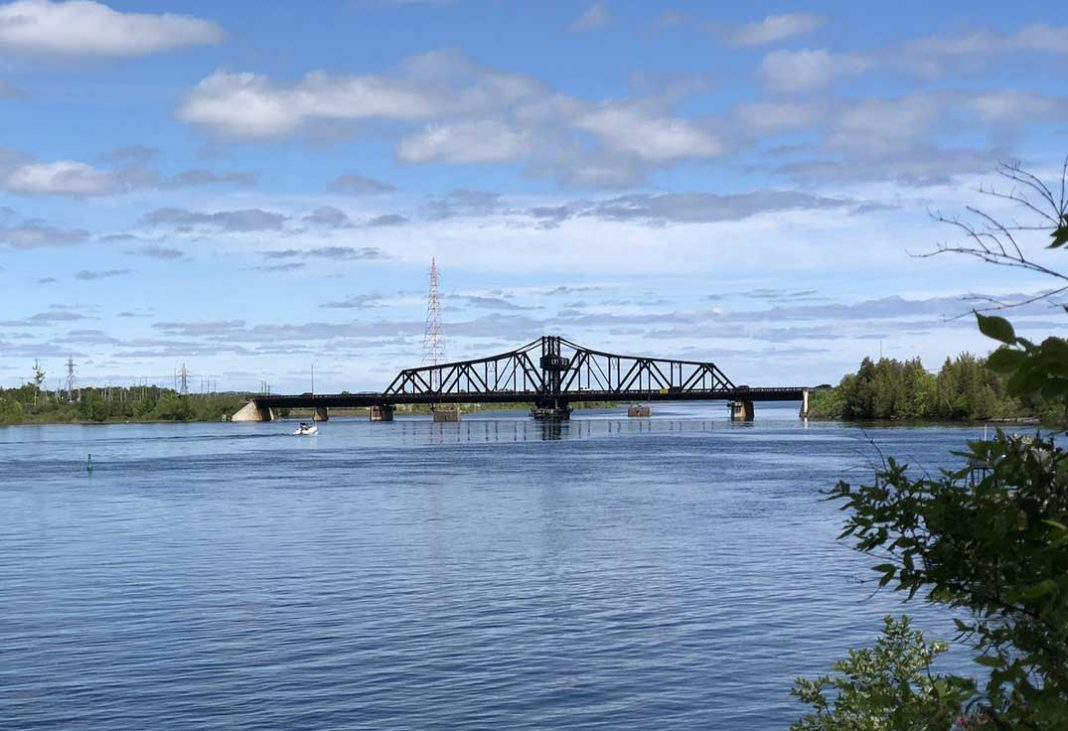Answer to frequently asked question
MANITOULIN – As more cases of COVID-19 emerge in Canada, Ontario and within Public Health Sudbury and Districts (PHSD)’s catchment area, many individuals have expressed concern about people coming to Manitoulin Island and carrying the virus with them, and those concerned people have advocated for checkpoints or opening the swing bridge to screen traffic heading to Manitoulin. The ability of Islanders to implement these measures, however, is a different question altogether.
The Northeast Town, which is home to the only link between Manitoulin and the mainland, has discussed the possibility of restricting Island-bound traffic.
As a conversation starter during the March 31 meeting of the Northeast Town, Councillor Michael Erskine asked Mayor Al MacNevin that oft-asked query: ‘can we close the bridge?’
The mayor deferred to CAO Dave Williamson, who explained, “The municipality does not control the provincial highway or a provincial structure (the swing bridge)—that authority resides with the province.”
Mayor MacNevin said some communities have suggested having people at the bridge to hand out information about COVID-19 or even doing testing.
“If people were tested at the bridge, the people would have to be trained and we currently are facing short supplies of PPE (personal protective equipment),” the mayor continued. “It’s not sustainable for the health care system and it’s not sustainable for us.”
The mayor said it would be more likely that the province would institute a travel restriction for all Ontarians.
“I think it’s clear that it’s (COVID-19) already here, it takes weeks to show up, and we need to act as though it’s already here,” Mayor MacNevin added.
The Expositor contacted the Ontario Ministry of Transportation (MTO) for context into the possibility of a swing bridge closure to protect Manitoulin Island. Spokesperson Kristin Franks did not directly address the legality of citizen-run blockades, but said there were no provincial plans to restrict traffic on any provincial highways or the swing bridge at this time.
MTO is not a traffic enforcement agency, but Ms. Franks did state that the ministry urges all drivers to stay home except for essential travel. She added that essential services such as grocery stores, manufacturing facilities and gas stations will continue to be accessible to all Ontarians.
To determine the legality of a citizen, or municipality-led screening checkpoint, The Expositor contacted the Ontario Provincial Police (OPP). OPP is responsible for traffic enforcement on all provincial highways in the District of Manitoulin.
OPP North East Region spokesperson Carlo Berardi said that unofficial checkpoints would come with significant public safety concerns.
“Municipalities and/or volunteer organizations have no authority to conduct checkpoints (or) slow down traffic on any provincial highways,” he stated. “The OPP encourages all Ontarians to voluntarily comply with the recommendations and Emergency Orders set out by the federal and provincial governments in an effort to reducing the spread of COVID-19.”
Another controversial topic has been whether seasonal residents should be allowed to visit their Manitoulin properties, when their permanent addresses are located elsewhere. On March 27, Ontario Premier Doug Ford said mayors from rural Ontario, especially in ‘cottage country,’ were having a hard time supporting their year-round residents when seasonal visitors come to town.
“The retail stores don’t have the vital essentials to keep the people that live up there all year round (supplied), and also the hospitals—they don’t have the capacity we do in urban settings,” said Premier Ford, who added that he was personally staying away from his Muskoka cottage.
Public health officials have also been urging people to stay at their permanent residences to help contain the spread of the virus, including federal Chief Public Health Officer Theresa Tam.
But while these are logical viewpoints that should be followed to avoid spreading the virus and further straining the health system, many cottagers have rejected those pleas and vowed to come to their seasonal residences anyhow. Under Ontario’s state of emergency declaration as it currently stands, there is no way of enforcing seasonal residents to stay put despite Canada’s chief public health officer urging everyone to remain at their main homes.
“Right now, staying (at a primary residence) is voluntary and we’re hoping people will pay attention to it. I believe a lot of them will but these are interesting times and it’s becoming clear that people can spread this virus without showing signs or symptoms. If you’re feeling good, you’d feel like you could go to the cottage but that can be really dangerous,” said Township of Billings Mayor Ian Anderson.
“Not a single leader anywhere in the world wants to discourage tourism and hurt the local economy,” said Mayor Anderson. “We have simply been enforcing what the federal and provincial governments have been telling people for weeks; that is, to stay within their principal residence and follow all (physical distancing) guidelines.”
A recent meeting of the Manitoulin Municipal Association revealed strong agreement among Island communities that seasonal residents should avoid visiting Manitoulin until public health officials say it is safe to do so.






